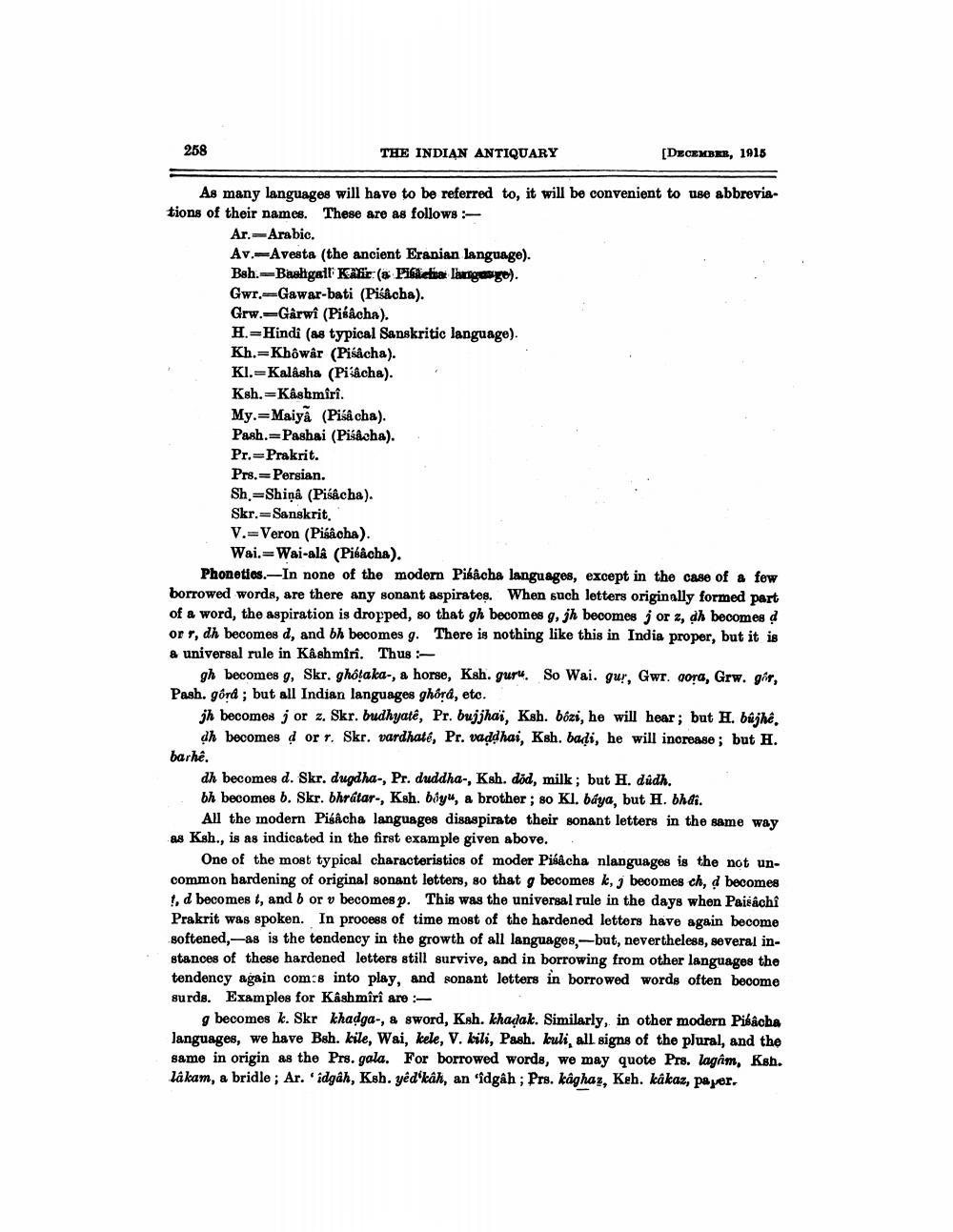________________
258
THE INDIAN ANTIQUARY
[DECEMBER, 1915
As many languages will have to be referred to, it will be convenient to use abbreviations of their names. These are as follows:
Ar.-Arabic. Av.-Avesta (the ancient Eranian language). Bah.Bashgall Kafir ( Pilileta hargasugo). Gwr.-Gawar-bati (Pisacha). Grw.-Gârwi (Pisacha). H.Hindi (as typical Sanskritic language). Kh.=Khôwâr (Pisacha). KI.=Kalasha (Pisacha). Ksh.=Kashmiri. My.=Maiya (Pisa cha). Pash. Pashai (Pisacha). Pr. Prakrit. Prs.=Persian. Sh.Shiņa (Pisacha). Skr.=Sanskrit V.=Veron (Pisacha).
Wai.=Wai-ala (Pikacha). Phoneties. In none of the modern Pikacha languages, except in the case of a few borrowed words, are there any sonant aspirates. When such letters originally formed part of a word, the aspiration is dropped, so that gh becomes g, jh beoomes j orz, dh becomes d orr, dh becomes d, and bh becomes g. There is nothing like this in India proper, but it is & universal rule in Kashmiri. Thus -
gh becomes y, Skr. ghótaka-, a horse, Ksh. guru. So Wai. gur. Gwr. gora, Grw. giit, Pash. gord; but all Indian languages ghord, etc.
jh becomes j or 2. Skr. budhyaté, Pr. bujjhai, Ksh. bózi, he will hear; but H. bájhe.
dh becomes d or r. Skr. vardhaté, Pr. vaddhai, Ksh. badi, he will increase; but H. barhé.
dh becomes d. Skr. dugdha-, Pr. duddha-, Ksh. död, milk; but H. dûdh. bh becomes b. Skr. bhratar., Ksh. bayu, a brother; so Kl. báya, but H. bhdi.
All the modern Pisacha languages disaspirate their sonant letters in the same way as Ksh., is as indicated in the first example given above.
One of the most typical characteristics of moder Pisacha nlanguages is the not uncommon bardening of original sonant letters, so that g becomes k, j becomes ch, a becomes 1, d becomes t, and b or v becomes p. This was the universal rule in the days when Paitachi Prakrit was spoken. In process of time most of the hardened letters have again become softened, -as is the tendency in the growth of all languages, - but, nevertheless, several instances of these hardened letters still survive, and in borrowing from other languages the tendency again com:s into play, and sonant letters in borrowed words often become surde. Examples for Kashmiri aro :
a becomes k. Skr khadga-, & sword, Ksh. khadak. Similarly, in other modern Pikacha languages, we have Bah. kile, Wai, kele, V. kili, Pash. kuli, all signs of the plural, and the same in origin as the Prs. gala. For borrowed words, we may quote Prs. lagam, Ksh. lákam, a bridle ; Ar. 'idgah, Ksh. yed'kâh, an 'idgâh ; Prs. kâghaz, Keh. kakaz, paper.




